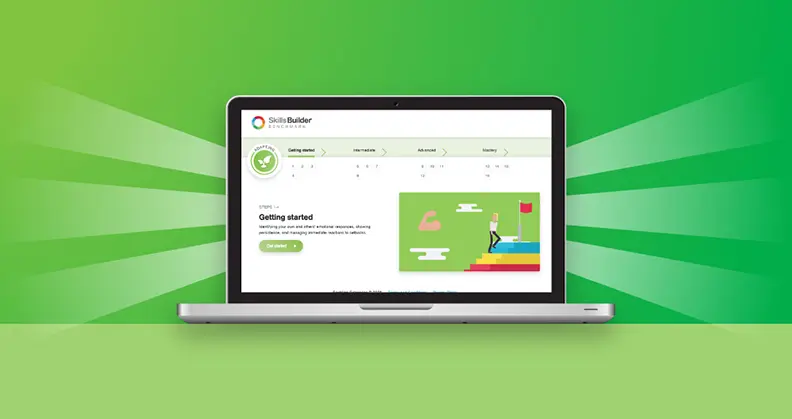In a series of spotlights, we’re exploring how some of our schools and colleges across mainstream and specialist settings are embedding the Skills Builder Principles. Along the way, we’ll share some examples, top tips and quick wins which have inspired us and hopefully will inspire you too!
For more success stories click here.

Principle 3: Measure it
Of the 6 Principles schools and colleges are adopting to effectively develop essential skills, we are going to focus on the third principle in this post: Measure It. This principle is about how we use measurement to better understand the needs of our students when it comes to their essential skills, and how we can track progress over time.
A key benefit of the Skills Builder Universal Framework is that by breaking the essential skills down into sequential learning steps, we can assess when each component step has been mastered, and therefore track students’ progress against age-related expectations. It would be impossible to teach essential skills with the same rigour as other subjects without an understanding of students' competence to inform what to work on next, and once we start assessing progress, we can see meaningful impact, reward progress, and learn the most effective ways of building essential skills.
Empowering teachers and students to measure the development of essential skills effectively is a key element of the Accelerator, our flagship education programme. Leading schools and colleges bring rigour to the essential skills through consistent measurement and formative assessment. Below you can read a summary of the different tools that schools and colleges are using to support this process, including the online Skills Builder Hub assessment tool and Skills Builder Benchmark.
Skills Builder Hub
.png)
The formative assessment tool on the Skills Builder Hub enables teachers to reflect on the essential skills of their group as a whole - they assess what proportion of their students have achieved each step. This is a quick and easy way to understand the needs of learners against the Skills Builder Framework and gives insights into the needs of the class as a whole. Teachers can then see the impact on learners’ essential skills with built-in tracking tools.
"Using the assessment tool once I have taught a skill allows me to think about what I need to work on next, whether it is the next step or another skill. Looking at the steps allows me to see what I need to do next and how to help them progress… I find this really helpful." Skills Leader at The Echelford Primary School, Surrey.
How schools and colleges are using the Skills Builder Hub assessment tool:
- Wolf Fields Primary School, Ealing, uses the Hub assessment tool to build an understanding of students’ competencies and then tracks student progress in the essential skills. Teachers assess the essential skills using assessment for learning through class discussions and any written work, both in dedicated Skills Builder lessons and when making cross-curricular links. This allows teachers to focus tightly on what needs to be learnt next.
- Watlington Community School, Norfolk, has a 'skill of the month’. With the increased pressure and workload of teachers due to the pandemic, this has allowed teachers to keep the focus on essential skills not only fresh, but also easy to manage; teachers assess progress in one skill at a time, rather than assessing all 8 skills at once. At Watlington, teachers also make sure students have opportunities to reflect on skills that have already been covered through their curriculum.
- Teachers at Buckden CE Primary School, Cambridgeshire, assess classes in all 8 essential skills at the start of the academic year and then reassess termly. This enables teachers to see how their students are progressing and celebrate their achievements.
Skills Builder Benchmark
.png)
Skills Builder Benchmark (for learners aged 11+) is a new self-reflection tool which enables learners to identify essential skills strengths and areas for improvement. Learners choose an essential skill and answer some structured questions to benchmark themselves against the Skills Builder Framework. They then see their top essential skill strengths, areas for development and practical ideas to improve. They can download a personalised Skills Report to share with a teacher or tutor. Schools and colleges use Skills Builder Benchmark to facilitate targeted skills-building, and to measure the impact of the work they are doing with students.
How schools and colleges are using Skills Builder Benchmark:
- Students at Grantham College, Lincolnshire, use Skills Builder Benchmark to track progress in essential skills and target areas for development, in conversation with their tutors or teachers.
- Students have scheduled time in Careers and Employability lessons and subject lessons (in designated weeks) to complete self-assessments.
- Students share their Benchmark reports with their tutors and from them create two personal SMART targets, to be logged on their online profiles.
- Teachers of 16-19 study programmes also complete group level baseline assessments on Skills Builder Hub and are encouraged to regularly update dashboards to keep track of progress and identify skill priorities.
- The Skills Leader is currently working on incorporating essential skills progress into performance management, to further incentivise staff to monitor students' progress.
- Another group of students at New College Durham have been using Skills Builder Benchmark to reflect on their essential skills and track progress.
- Some learners are using Benchmark alongside Skills Builder Launchpad: they can identify strengths and areas for development on Benchmark, then build their essential skills through interactive, online modules on Launchpad.
- The plan next year is to continue to use Benchmark and Launchpad. All students will complete Benchmark at 3 points during the year and then be shown which Launchpad modules they should complete as a result.
Schools and colleges using their own existing systems to measure student progress in essential skills against the Skills Builder Framework
“Using the Skills Builder Framework has allowed us to further personalise skills development for all through a shared understanding of progressive steps.” Skills Leader, Bothal Primary School, Northumberland.
- Pioneer House, Manchester, has its own spreadsheets and Education, Health and Care Plan reviews to track students’ progress against the Expanded Framework. On their spreadsheets, they rate each individual student for each step of the Expanded Framework. Each student’s progress is tracked throughout their entire journey through school.
- At Bothal Primary School, Northumberland, pupil case studies are used to analyse essential skills alongside development gaps to ensure individual plans fully interact with the curriculum offer, and targets are further refined for SEND learners. All members of SLT have completed a case study of a student who was struggling with behaviour, tracked them and assessed their essential skills and then made teaching recommendations based on this.
- Sacred Heart High School, London, is using an end-of-year survey to capture students’ reflections on their progress in essential skills. Weaker skill areas will then be targeted through experiential learning next year (including employer encounters).
Skill Passports and Workbooks
Both resources are available in digital and paper format
.png)
Some of our schools and colleges also use our Skill Passports and Workbooks to measure students’ progress in essential skills. In the Workbooks, students reflect on their skillset and evidence when they have demonstrated skill steps, with space for facilitators to sign off progress. The Passports allow learners to gather a portfolio of evidence for each skill, and facilitate conversations about the essential skills between learners and teachers.
- The students at Catcote Academy, Hartlepool, have a range of learning needs. The Sixth Form uses the Skills Builder Passports to help students measure their own progress against the different skills. In turn, this helps students to evidence and articulate their essential skills outside of the classroom.
- New College Durham adopted a blended learning approach to teaching in response to the Covid-19 restrictions and the pandemic. As part of the remote offer all learners have completed the Skills Builder Workbooks. Where digital poverty was an issue, students were posted the Skills Builder Workbook to complete.
Careers and employability platforms
It’s also worth mentioning that a growing number of careers and employability platforms in the Skills Builder Partnership are now encouraging and supporting students to log evidence of when they are demonstrating essential skills, to reflect on and track their progress in essential skills, and/or to set essential skill targets. Teachers can often create activities and tag which essential skills and steps are targeted through those activities.
Some of the schools and colleges we work with use the resources on the Skills Builder Hub to teach and reinforce the essential skills, and then use careers and employability platforms to track their development. For examples of quality-assured careers management platforms that support essential skills development, please see our Impact Directory and select the ‘Careers and Employability’ theme.
.png)
At a school or college level, we know it can be challenging to introduce a new type of assessment. We find that those who are doing this well focus on how the data can be used, making sure teachers receive training beforehand so they can see it in action and understand its value. They reduce the stakes by making clear that this is a formative assessment which should be used to support teachers with planning. They also encourage teachers to keep returning to the assessment so that teachers see the impact of their work with students and use it as a formative tool.
By following the principle of Measure it, schools and colleges are facilitating progress in essential skills and enabling students to achieve their potential.
To hear more from our schools and colleges, look out for our next spotlight on focusing tightly on building essential skills, or browse our success stories at skillsbuilder.org/educators.


.jpg)



